November 17, 2017
Warm greetings from North Gate Hall:
Fall is here, the air is crisp and fresh and, thankfully, the sharp smell from the devastating fires to the north of us has faded. Even while we remain in a defensive crouch–alongside many of you in this bizarre political culture, where journalism’s legitimacy is in perpetual dispute–we can all take comfort in some of the notable accomplishments of friends and family from the semester that’s coming to an end: a Student Oscar for 2017 graduate Brad Bailey for his and classmate Isaac Smith’s remarkable documentary short on Berkeley-based disability rights pioneer Hale Zukas, 73, who has had cerebral palsy since birth; a Pulitzer for lecturer Thomas Peele for the Bay Area News Group coverage he led of Oakland’s horrific Ghost Ship warehouse fire; 11 news and documentary Emmy nominations for Berkeley Journalism teachers and alums; a student Online Journalism Award (OJA) from the Online News Association–our ninth year in a row–and the debut of our new Advisory Board.
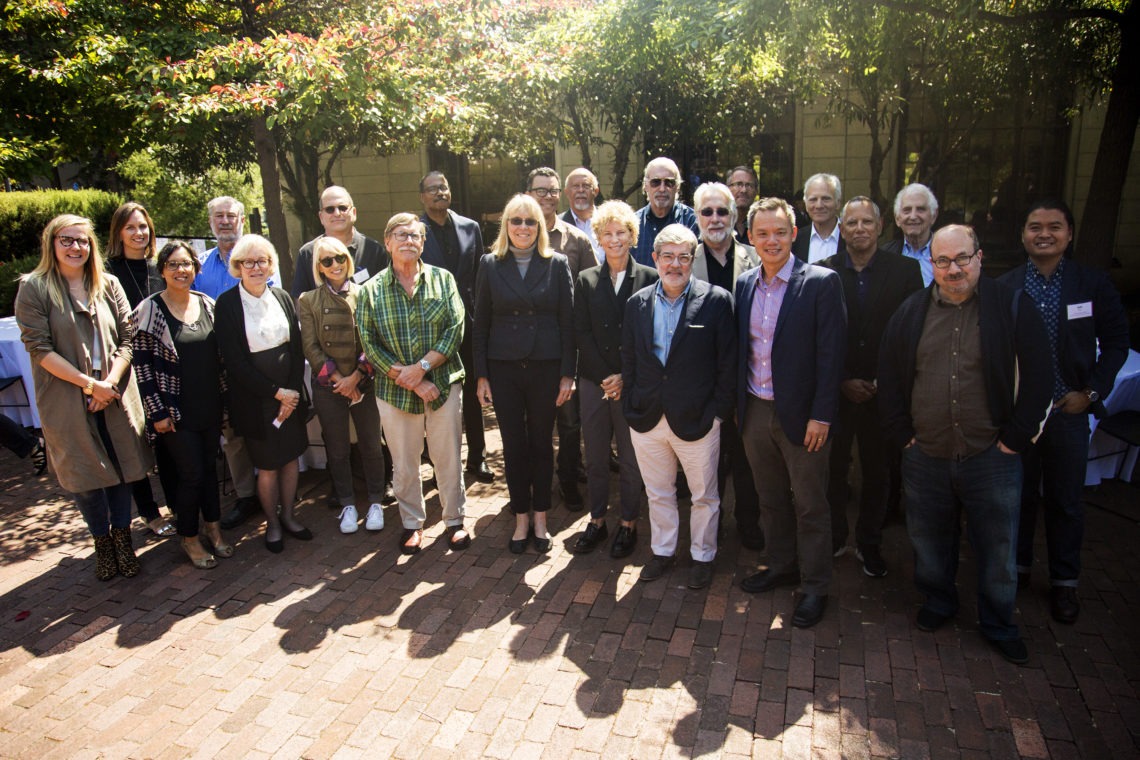
Participants in the inaugural meeting of the School’s Board of Advisors: Front, from left: Mary Newman (’18), Carrie Lozano (’05), Jo Anne Wallace, Minette Nelson, Bob Bishop (’77), Esther Wojcicki (’64), Simone Coxe, David Corvo, Richard Gingras, Edward Wong (’98), Craig Newmark. Rear, from left: Angela Filo (’99), Steve Silberstein, Jonathan Logan, Bill Whitaker (’78/’17), Peter Nicks (’99), Ernest Wilson, Richard Logan, John Battelle (’92), Edward Wasserman, Dean Baquet, Daniel Ellsberg, Rafael Roy (’18). Photo: Jacqui Ipp (‘16)
Awards season is upon us, and we have a bumper crop to celebrate. Lecturers Dave Gilson (’02) and Dan Krauss (’04) and nine other alums including Bill Whitaker (class of ’78 & ’17), Sweta Vohra (’10), Emily Taguchi (’06), Durrell Dawson (’06), Marjorie McAfee (’06), Shilpi Gupta (’03), Daphne Matziaraki (’16), David Corvo (’72) and Edward Wong (’98) were honored in the latest round of Emmy News & Documentary Awards, some with multiple nominations.
May grads Lucas Waldron and Peter Bittner (both ‘17) were nominated for the Online Journalism Association’s prestigious David Teeuwen Student Journalism Award for their master’s projects. Bittner won. Watch the grace with which Waldron accepts the award on his classmate’s behalf, while former lecturer Joshua Johnson, now host of National Public Radio’s syndicated “1A,” gives the School a warm shout-out.
Fourteen alum, faculty and students won awards from the Society of Professional Journalists, Northern California Chapter, including the top honor winner Emilie Raguso (’06), who was named Journalist of the Year. Other honorees were: Andrew Becker (’05), Maggie Beidelman (’13), Dave Gilson (’02), Hunter Holcombe (’12), Sasha Khokha (’04), Sukey Lewis (’15), Ryan Lillis (’06), Victoria Mauleon (’01), Mark Oltmanns (’12), Lisa Pickoff-White (’09) and Zach St. George (’14).
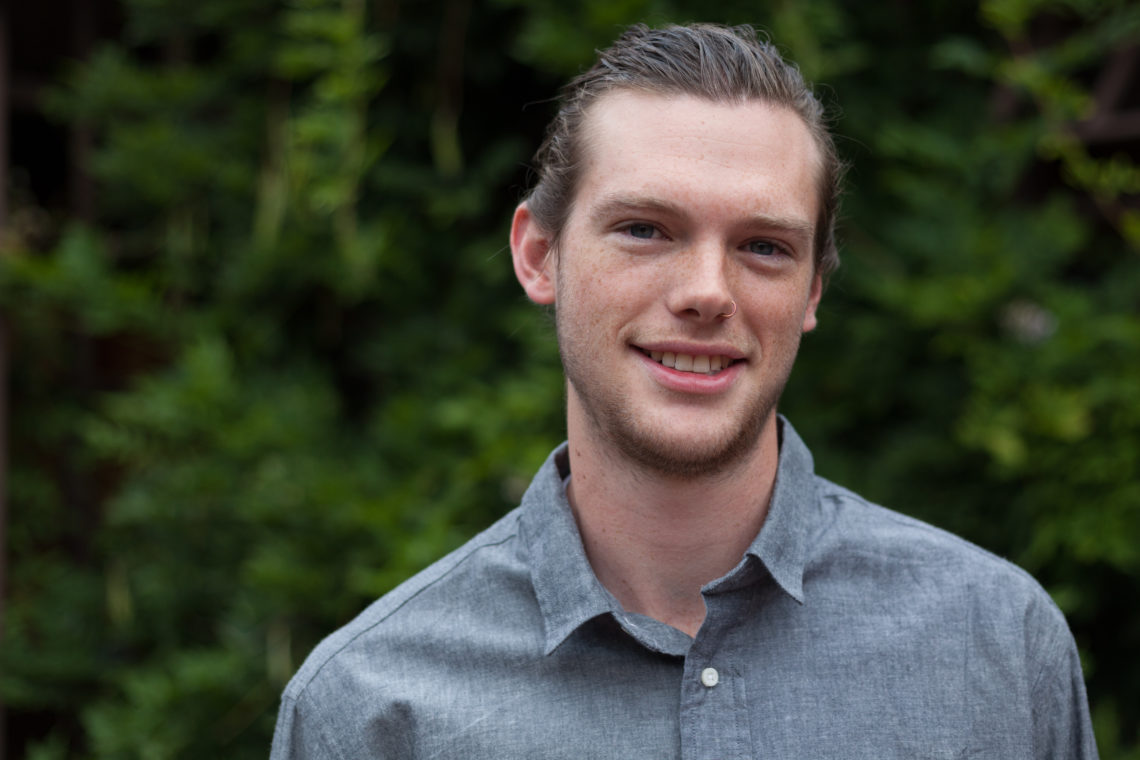
Reis Thebault (Photo: Martin Totland ‘16)
Reis Thebault (’18) received SPJ NorCal’s top student award for his stories on fraud and corruption, which were posted on Richmond Confidential.
And lecturer Bob Calo, who retired in May, received the Directors’ Distinguished Service to Journalism Award for his many years of mentoring broadcast journalists. Calo taught at the School since 2001, having worked for ABC News’s “Primetime Live” and NBC News, handling assignments throughout the U.S. and in Pakistan, Chile, Croatia, Kenya and Somalia.
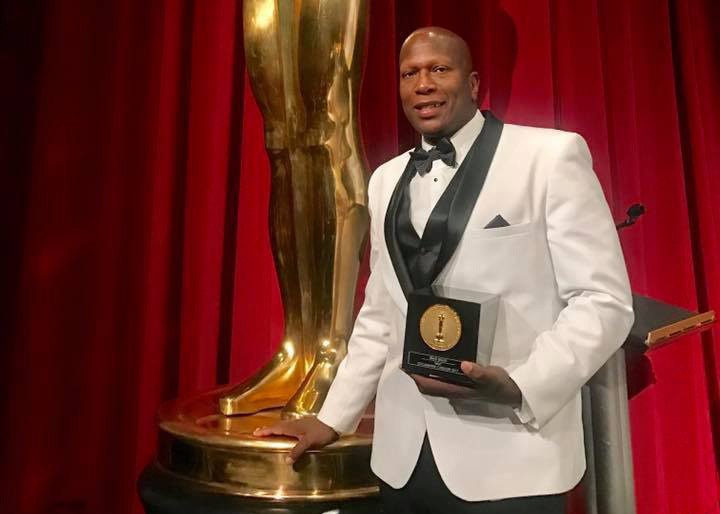
Brad Bailey and his Student Oscar.
Brad Bailey (‘17), who won a Student Oscar for his and classmate Isaac Smith’s remarkable documentary short on disability rights pioneer Hale Zukas, came to Berkeley in 2015 as a Johnathan Rodgers Fellow, a fellowship named for, and funded by, broadcast exec and entrepreneur Johnathan Rodgers (’67). Bailey’s film was a broad collaboration. Along with co-producer Isaac Smith, 11 of Bailey’s colleagues took part: Pablo De La Hoya and Abner Hauge (’18) were associate producers and cinematographers. Loi Ameera Almeron (’16), Joe Bush, Nailah Morgan and Mahlia Posey (all ’17), Alan Toth, Jeff Weisinger, Nani Sahra Walker, Khaled Sayed and Grace Oyenubi (’18) assisted with production.
Jason Hanasik’s (‘17) “How To Make A Pearl,” on the inner landscape and outer reality of John Kapellas, who for the last 10 years has lived in complete darkness, was nominated too. The documentary was also nominated for the IDA’s David L. Wolper Student Documentary Award and has been acquired by The Guardian’s Documentaries division. It will debut online in 2018 after its film festival run.
Bailey’s win marks the second straight year that a Berkeley Journalism student has won the prestigious Academy Award competition. An impressive four School students in the last two years received nominations. That record is testimony to their drive and imagination, and to the dedication of the teachers they study with. We could not be prouder.
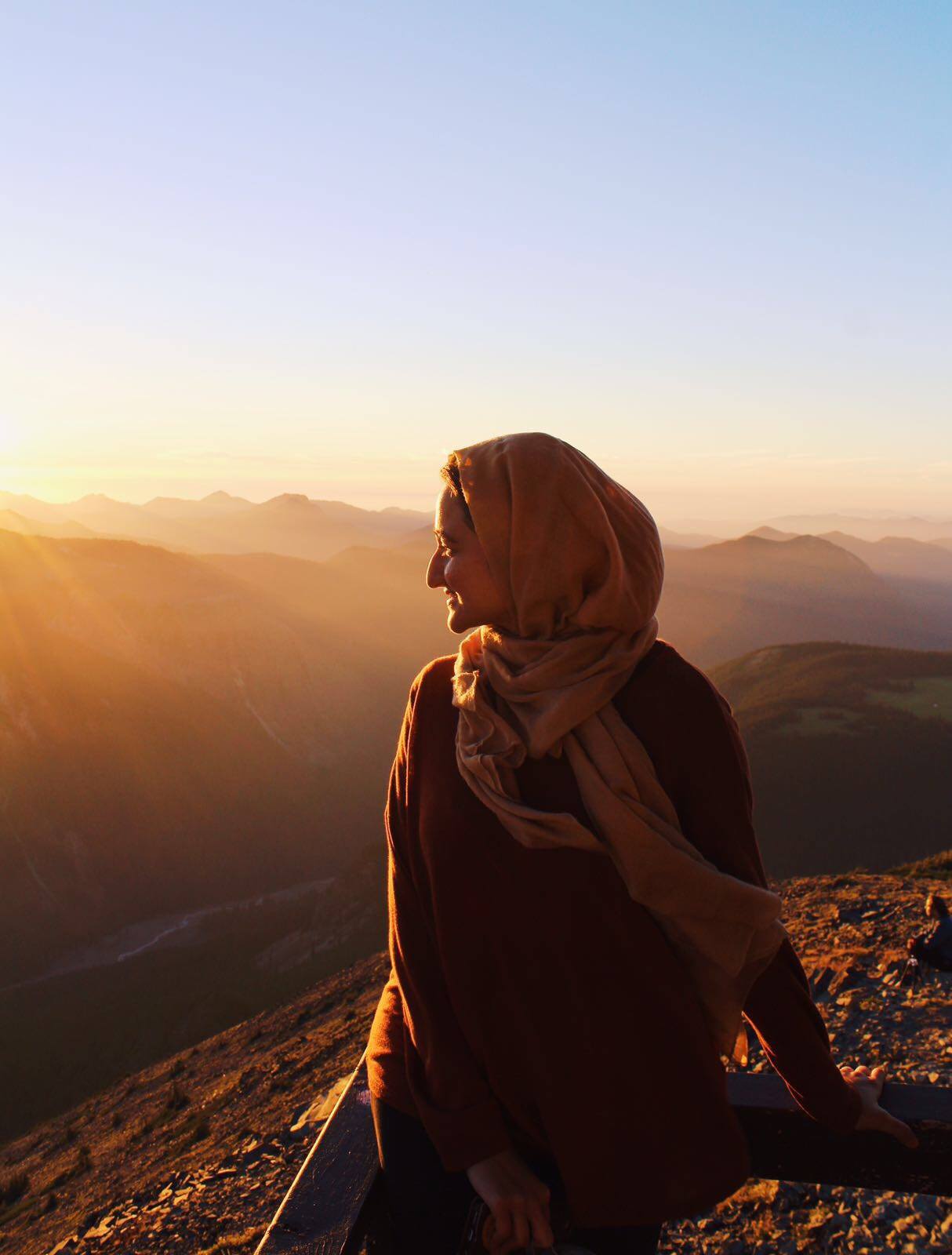
Atia Musazay in Afghanistan earlier this year.
Atia Musazay’s (‘17) thesis project on an Afghan organization that teaches women how to hike and rock climb in their country amidst harassment and threats of violence aired on the PBS NewsHour in October.
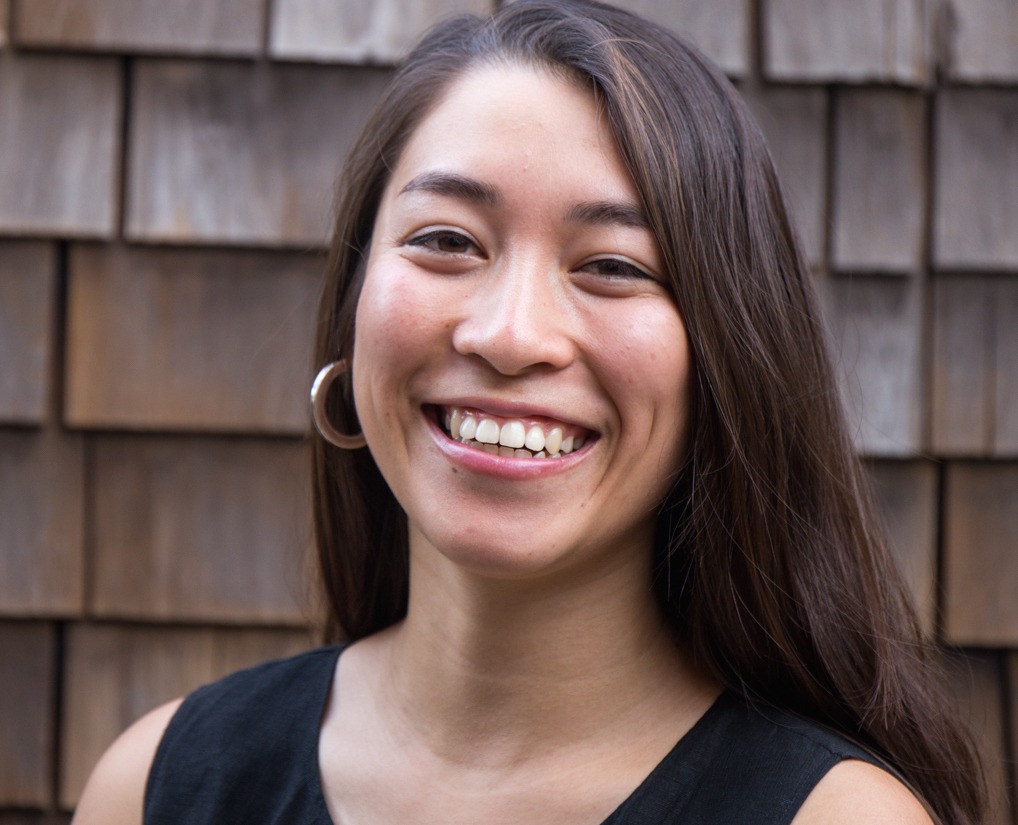
Samantha Clark (Photo: Pablo De La Hoya)
Second-year student Samantha Clark, a writer, editor, and photographer, was awarded the School’s third annual Jim Marshall Fellowship for photojournalism.
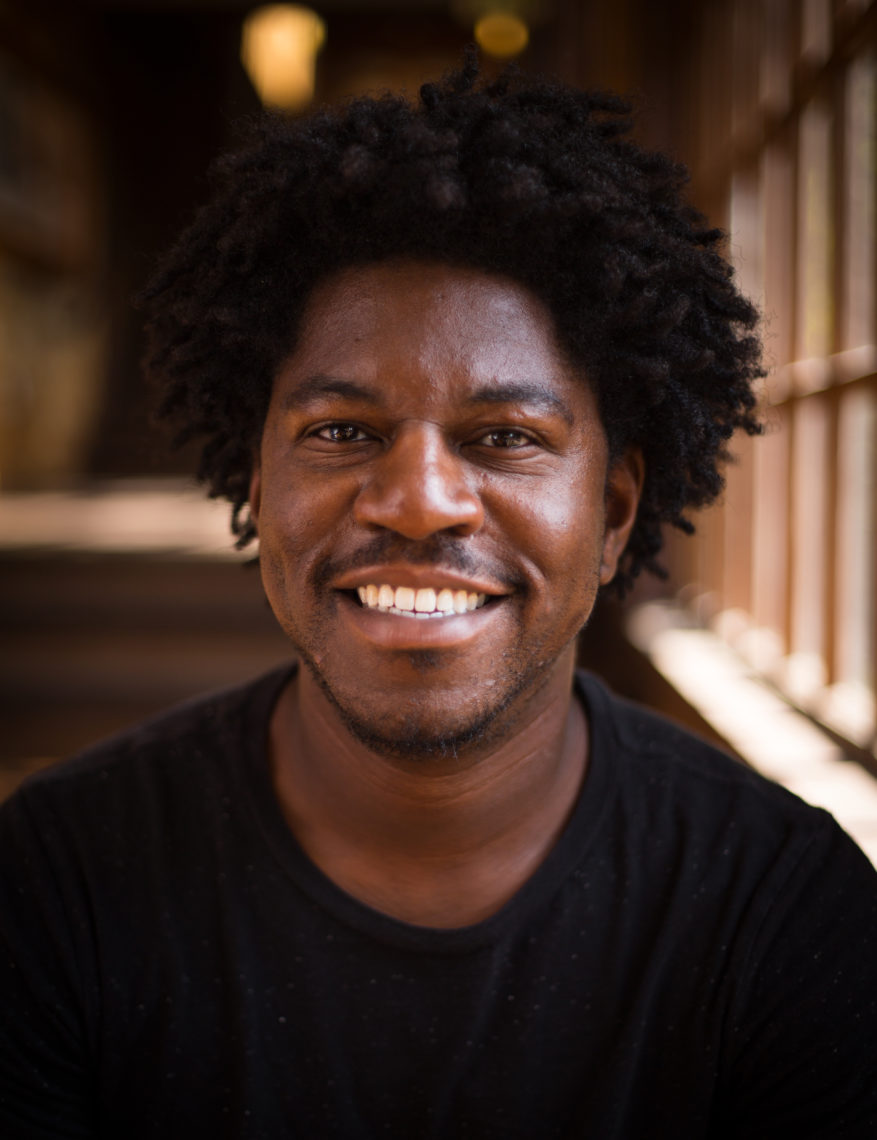
Serginho Roosblad (Photo: Rafael Roy)
Serginho Roosblad (’18), a documentary student who focuses on telling stories about homelessness and displacement, won this year’s Marlon T. Riggs Fellowship in Documentary Filmmaking.
Pulitzer Student Fellows Sawsan Morrar (‘18) and Anna Clausen (‘18) presented their reporting projects at a special Pulitzer Center event in Washington, D.C., in October. The program offers fellowships to students at Campus Consortium partners like Berkeley so they can pursue international reporting projects on topics and regions of global importance, with an emphasis on issues that have gone unreported or under-reported in mainstream American media.
Ariel Plotnick (‘18) won first place in the College Broadcasters’ 2017 National Student Production Awards for “Running Low on the 510.” Fourth place went to “DNA Algorithms,” by Christina Koningisor, a privacy law fellow at Berkeley Law. Both winning pieces aired on North Gate Radio, a program produced at the J-School. The weekly show has been carried by KALX since 1983.
We make it a point to celebrate the continuing success of Berkeley Journalism graduates and teachers and use their careers to guide those who follow them. That’s why we asked Sam Goldman (‘19) to write alumni portraits of acclaimed narrative writer Jon Mooallem (‘06) and political reporter John Myers (‘95). Plus, Rosa Furneaux (‘18) profiled lecturer Tom Peele with a behind-the-scenes look at his Pulitzer win.
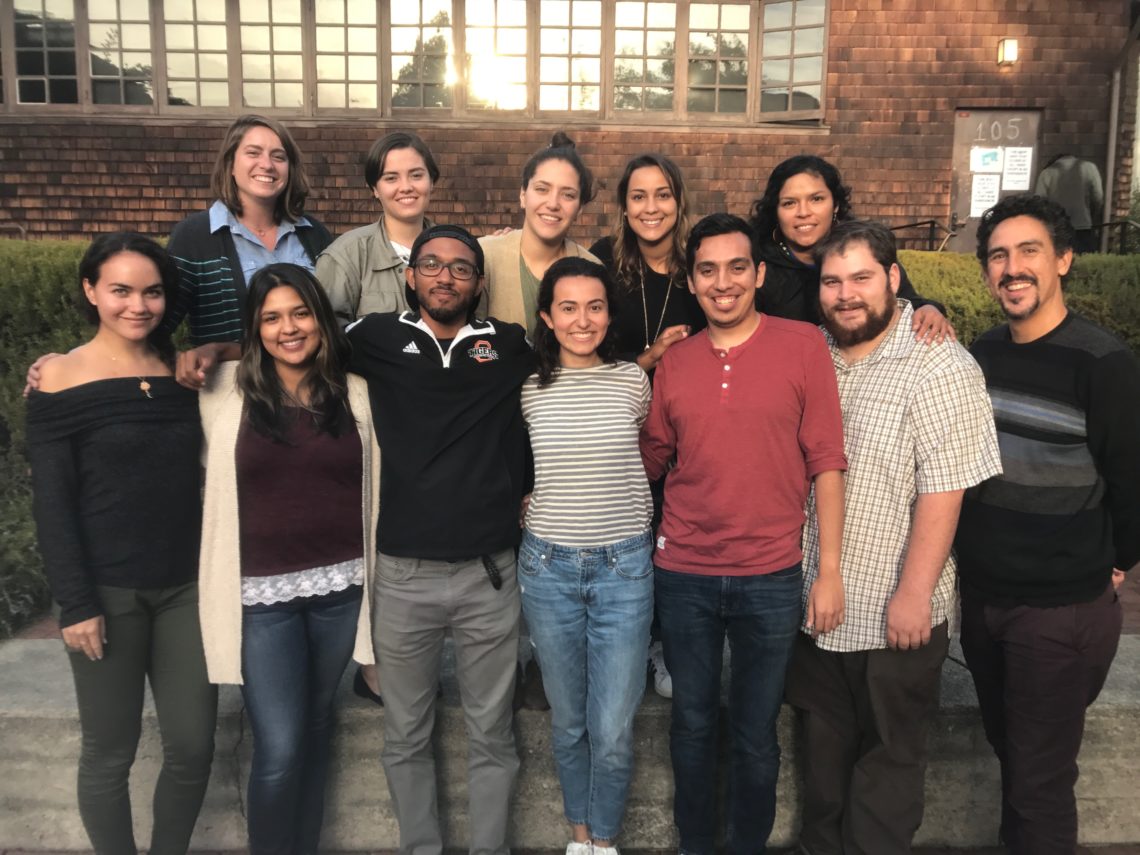
Members of the School’s National Association of Hispanic Journalists chapter, front row from left: Eleni Gill (’19), Alondra De La Cruz (’19), Alex Nieves (’19), Sarah Cahlan (’19), Pablo De La Hoya (’18), Nate Sheidlower (’18), Prof. Andres Cediel (’04). Back row, from left: Francesca Fenzi (’19), Vianey Alderete Contreras (’19), Marian Carrasquero (’19), Karla Caraballo-Torres (’19), Liliana Michelena (’18)
Alex Matthews (’19) profiled the members of our National Association of Hispanic Journalists (NAHJ) chapter, led by president Pablo De La Hoya (’18).
In September, I was honored to give the keynote address for California State University, Bakersfield’s Kegley Institute of Ethics 13th Annual Fall Lecture. The lecture, titled “Fake News and the Threat to Democracy,” explored the ways that the current dustup over deliberate fabrications harvests and exploits longstanding public skepticism over news practices. I must say I was surprised by the suspicion and anger I encountered that was directed at the massively influential information platforms–Facebook and Google, chiefly–which are emerging as tempting political targets for reform efforts. Watch my talk here.
I’m pleased to report that Dave Gilson (‘02), a senior editor at Mother Jones, has been back at the School this term, teaching a topical J200 section focused on immigration. He joins a number of alums who teach at the School, including Daffodil Altan (‘04), Marilyn Chase (‘73), Andres Cediel (‘04), Kara Platoni(’99), Elena Conis (‘04), Jennifer Kahn (’00), Tim McGirk (‘74), Bill Drummond (‘65), Laura Klivans (‘16), Jeremy Rue (’07), Anna Sussman (‘05) and Zach Stauffer (‘08).
Lecturer Mark Schapiro is participating in the Global Investigative Journalism Conference in Johannesburg, South Africa. Schapiro will report on investigating international agriculture industries and climate change, and appear along with panelists from Africa and Latin America.
Schapiro’s story on the journey of Syrian seeds to Italy, where they’re now at the center of an unprecedented experiment that could challenge the plant patent system, appeared in Mother Jones magazine in October. The piece arose from reporting for his book on the seeds that are needed to respond to climate disruptions, Seeds of Resistance, scheduled for publication in 2018.
In staff news, after a nationwide search, Berkeley Journalism has doubled the size of its advancement team with the appointment of Maura Smith, a Boston-area development specialist who will spearhead a new 50th Anniversary campaign to fund teaching positions, replace aging infrastructure, and replenish our financial aid and equipment resources. Add this rainmaker to your address books: (510) 643-3840 maurasmith@berkeley.edu.
It’s with regret that I report the pending retirement of former dean Tom Goldstein, celebrated author and professor of journalism and director of the Media Studies Program at Berkeley. Goldstein worked as a reporter at AP, Newsday, The Wall Street Journal and The New York Times, and has been a journalism educator for nearly 30 years, first at the University of Florida, then at Berkeley Journalism (where he served as dean from 1988 to 1996); at Columbia (where he served as dean from 1997 to 2002) and as interim dean at the J-School. He has also been my guide and mentor, and he’ll be greatly missed.
The Investigative Reporting Program held its second Professional Workshop from Oct. 22-24. The workshop brought 11 documentary filmmakers together with top instructors in the field, including Reva and David Logan Distinguished Chair in Investigative Journalism Lowell Bergman, IRP Managing Editor John Temple, ABC News senior vice president of editorial quality Kerry Smith, attorney and Berkeley Journalism Lecturer Thomas Burke, and award-winning filmmaker Dawn Porter.
The Investigative Reporting Program is now accepting applications for its next Professional Filmmakers Workshop, which will be held February 4-6. The goal of this workshop is to elevate the journalistic standards of independent filmmakers, increase the impact of their stories, and help them break new ground.
Lecturer Thomas Burke recently represented 42 ACLU affiliates nationwide in opposing a government motion to transfer to Washington, D.C., 13 Freedom of Information Act (FOIA) lawsuits that seek documents about how the Trump Administration has enforced the so-called Muslim Travel Ban. The ACLU affiliates objected that this jurisdictional transfer would hinder public understanding of how Trump’s travel ban has been implemented. Burke is now representing ACLU affiliates in travel ban FOIA lawsuits in San Diego, Los Angeles and San Francisco.
On the events front, we’ve had some terrific speakers this fall in our newly renovated library (a fully media-enabled space transformed thanks to the generous and far-sighted support of the Jonathan Logan Family Foundation.) Among the guests were Politico and Axios co-founder James VandeHei; Russian journalists Elizaveta Osetinskaya and Roman Badanin in a conversation titled “Trump and Russia: The perspective from Moscow,” hosted by Prof. Lowell Bergman; an appearance by investigative reporter Jeff Gerth on “How and why the media gets the story wrong;” alum/TIME Africa Bureau Chief and international correspondent Aryn Baker (’01) on contemporary visual storytelling, with alum/lecturer Tim McGirk; dataviz expert Alberto Cairo and alum/lecturer Jeremy Rue on discovering falsehoods in graphics; Martin Reynolds of the Maynard Institute on how to report thoughtfully on stories involving race and class, and Franklin Foer of The Atlantic talking about the ways that tech enables/disables us as journalists. (Listen to Lecturer Deirdre English’s interview with Foer on our “On Mic” podcast.)
The IRP’s John Temple moderated a conversation with Raissa Robles, author of “Marcos Martial Law: Never Again, A brief history of torture and atrocity under the New Society.” Robles’ presentation, “Living Dangerously: Investigative Reporting from Marcos to Duterte,” was webcast and can be viewed here.
In September, it was my pleasure to host the inaugural conclave of our 28-member Board of Advisors, 21 of them on hand. The goal of the first meeting was to enable group members to get acquainted, become familiarized with the School and, above all, to share insights on how the School could increase its reach, capacities and stature. We were privileged and honored to host this exceptional group of media professionals, innovators, educators and thought leaders and are already implementing the group’s recommendations.
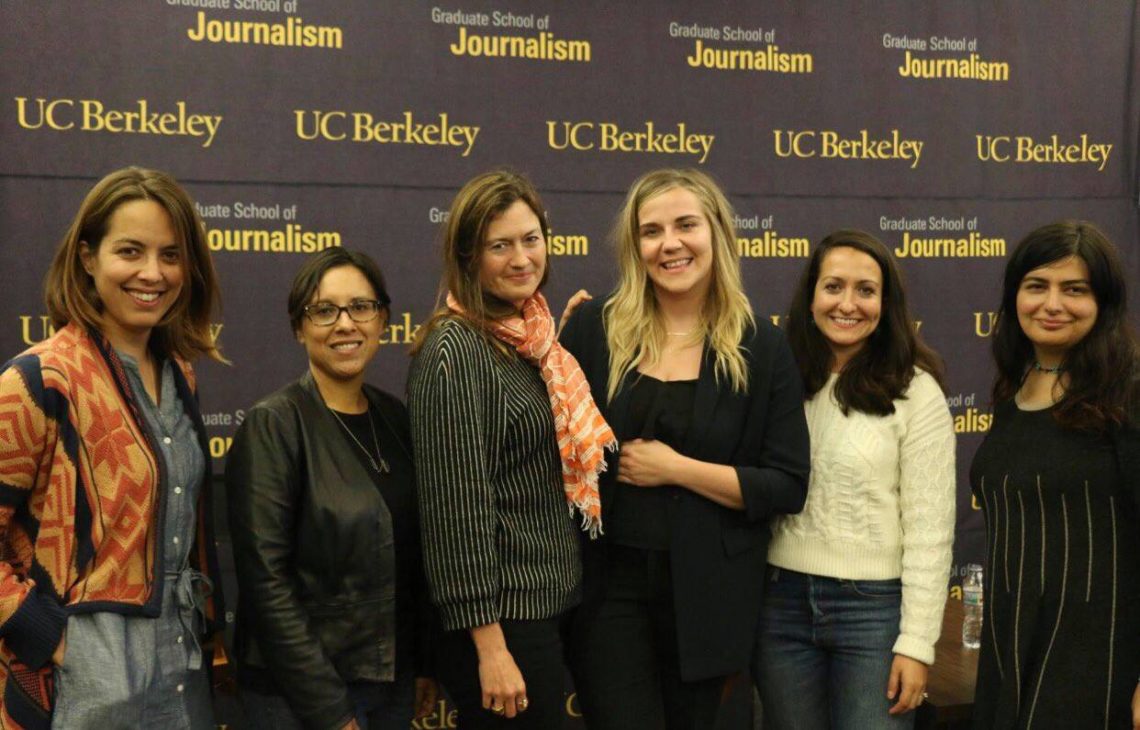
From left: “Sexism on Set” panelists Paula Neudorf, award-winning producers/alums Carrie Lozano & Jessie Deeter, moderators Mary Newman (’18) and Emily Thomas (’18) with Iranian producer Rokhsareh Ghaemmaghami 10/30.
The spate of recent news about the workplace harassment of women led to a panel convened by Mary Newman and Emily Thomas (both ‘18) titled “Sexism on Set” with award-winning producers/alums Carrie Lozano (’05) and Jessie Deeter (’01), lecturer Paula Neudorf and Iranian producer Rokhsareh Ghaemmaghami.
In October, lecturers Jennifer Kahn (‘00) and James Fahn presented “Innovative Approaches to Teaching Science Journalism” at the 10th World Conference of Science Journalists, a San Francisco gathering of some 1,400 international professionals dedicated to engaging, incisive, high-quality coverage of science.
Our most recent photo exhibit, “Resisters: 50 Years of Social Movement Photography in the Bay Area,” will hang in the Reva and David Logan Gallery in the halls of the School through Dec. 22. The public is welcome.
Professor Ken Light’s “What’s Going On: 1969–1974,” featuring his earliest photos from 1969 to 1974 documenting the social, cultural and political landscape of America as it roiled with upheaval, is soon to be published by renowned German fine-art photography publishing house Steidl.
The book, which Aperture magazine says “shows us the collective movement forward, in love and in struggle, on both sides of the political divide, and exemplifies the power of photography to both reveal and form those movements,” chronicles Light’s transformation from student activist to social documentary photographer.
Light will also participate in a show at the Center for Arts and Religion’s Douglas Adams Gallery called “Religion & Resistance” from Feb. 6 – May 25, 2018.
Other upcoming dates of interest: The deadline for admissions to the Class of 2020 is Dec. 1… Undergraduates can begin signing up for the third summer journalism minor on Feb. 1, 2018… Our new line-up of digital media courses at the Berkeley Advanced Media Institute (BAMI) is now available: from VR: Immersive 360-Degree Video Storytelling, to Mobile Media: Producing Visual Stories With Your IPhone, to intensive nine-week graduate level certificate programs in digital media and podcasting. The courses not only constitute an investment in your professional future, they also contribute to the School’s bottom line. Register today.
BAMI has extended its footprint to producing podcasts for clients. Want to get on the podcasting bandwagon, but don’t have the resources to produce one? Let our experts, many of them alums of the School, do it for you.
Check out three recent podcast series for the kind of services we can provide: “Just Food” for the Berkeley Food Institute, “Be the Change” for Berkeley Law’s Thelton E. Henderson School of Social Justice, and an innovative GPS guided audio walking tour for the Telegraph Avenue Business Improvement District.
On Jan. 22 we will host a showcase of work coming out of the School called “Visioning the World,” as part of UC Berkeley’s Arts + Design Mondays at the stunning new downtown Berkeley Art Museum/Pacific Film Archive (BAMPFA.) The focus is on visual journalism–documentaries, New Media, video journalism and documentary photography. Assistant Professor Richard Koci Hernandez will be the Master of Ceremonies at this free event.
On Feb. 8, we will join KQED in hosting a 30th anniversary celebration of legendary radio host Michael Krasny of KQED’s “Forum,” and on March 1, the J-School will host a special event in honor of alum and educator Esther Wojcicki (’64), followed by a lecture/panel discussion between myself and our inaugural Wojcicki Lecturer Kara Swisher, one of the most respected journalists covering Silicon Valley. We look forward to having Esther and Kara here.
In closing, as you know, the Graduate School of Journalism is a nearly 50-year-old institution of national importance. We have the awards and accolades to prove this academy is functioning at a world-class level. And like our colleagues at major national news organizations who are turning to new revenue sources (from conferences to educational travel) to fund their reporting, public higher ed must seek out support too: from our Berkeley Advanced Media Institute, to our to-be-created audio storytelling studios, to a new push to get folks like you onboard philanthropically.
At a time when costs are rising and the campus contribution to the J-School isn’t (in much the same way that advertising dollars no longer flood newspapers), and your inboxes are firehosed with pleas from all kinds of deserving organizations, we urge you to make a contribution–however big or small– by Dec. 22. Your support keeps access and excellence alive.
Wishing you and yours a warm holiday season,
Ed Wasserman
Dean
Note: In order for a check sent by mail to be considered a 2017 donation, the envelope must be postmarked no later than December 31. Silicon Valley friends: If you are interested in making a gift of stock, please contact central campus at (510) 642-6791 or via givesecurities@berkeley.edu. Make sure to specify the Graduate School of Journalism as the recipient.
Many of us are already accustomed to supporting our local public radio/TV stations with recurring gifts. Establishing recurring gifts are convenient for the donor (and your accountant) and give the J-School a reliable source of income we can count on. You choose the amount you wish to give monthly or annually. Pledges can be changed or cancelled at any time. Reference our giving FAQ for more information.
About this communique: News from the Desk of Edward Wasserman is a quarterly email newsletter sent to alumni, donors, students, faculty, media partners and others in the J-School’s broad community. Should you wish to follow ongoing developments, please follow uson Facebook and Twitter @ucbsoj.
Have alumni news or accomplishments to share? Please send it, along with a high-res headshot to us at journalism@berkeley.edu.
